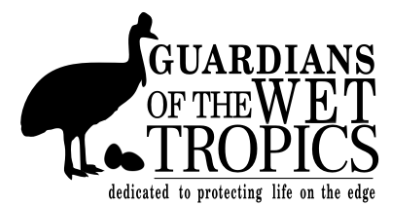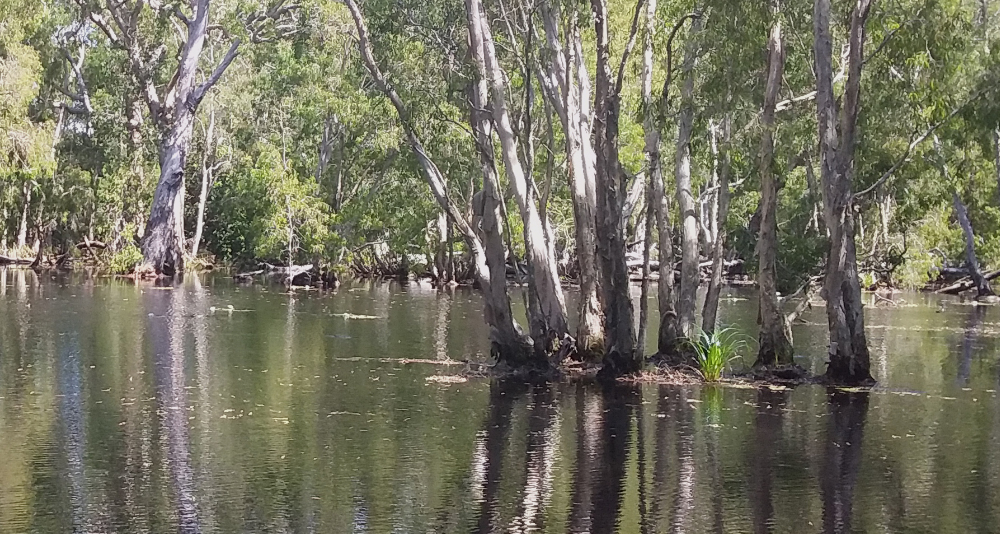
New to the area what you should know
The first step is to learn whose traditional land you are on and contact them and pay your respect as a friendly neighbour to the area. You can find more information on whose land you’re moving to on Terrains Natural Resource Plan for People and Country along with a lot more interesting information to help you get familiar and feel more at home.
We consider it a privilege to live in the Wet Tropics World Heritage and all World Heritage sites are considered globally significant, meaning World Heritage Areas belong to everyone. Their conservation and protection are considered important for current and future generations.
In 1988, Australian and international experts assessed the Wet Tropics World Heritage Area as being of outstanding universal value, meeting all four natural heritage criteria for World Heritage Listing. www.wettropics.gov.au/world-heritage-listing

Click to go to topic:
Cassowaries | Domestic Predatory Animals (dogs & cats) | Other Pets | Your Garden | Living with Wildlife | Things that Bite or Sting | Coastlines | Marine Life and our Oceans | Handy Contacts
Cassowaries
“A fed bird is a dead bird”
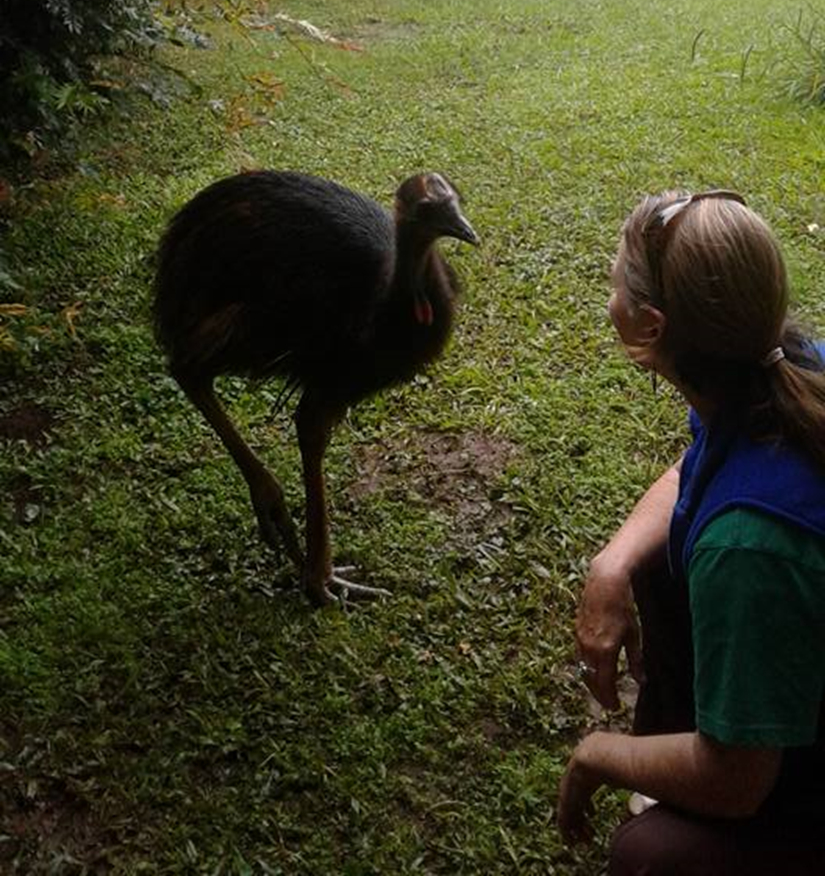
This cassowary became domesticated by neighbourhood feeding. Now grown into a teenager was becoming increasingly aggressive. This bird required relocation for public safety.
While seeing a cassowary is a treat, it is illegal to feed or attract cassowaries. Cassowaries attracted into urban areas can become sick from eating a diet not suited to their biology and are more exposed to car strike and dog attacks. Fed cassowaries have the potential to become dangerous when expecting food that isn’t delivered, when mating or with chicks. Cassowaries have a very important ecological role in rainforest seed dispersal keeping the ecosystem healthy and diverse. They are known as the “Gardeners of the rainforest”.
Many Traditional Owners have strong connections to cassowaries and have stories, dance, song, art and for many it is their totem.
After two recent cyclones, Qld Parks and Wildlife Service arranged food stations to support cassowaries through the short-term food shortage. Unfortunately, some cassowaries and people have continued feeding which does not result in a good outcome for the cassowary.
Some important points for living with cassowaries
Cassowaries can be very dangerous and unpredictable.
Cassowaries are much like a chook.
- They sleep on the ground at night.
- They have no night vision and will not move around once dark.
- They have fast twitch muscle fibres meaning the can run very fast for a short time before they become exhausted.
- They can protect themselves from dog attack in the day with dogs sometimes coming off second best, however the odds change at night.
- Dogs can run for hours, have great hearing, smell, and night vision, and can harass a bird to the point of death.
“If you own a dog, you are 100% responsible”
- Always keep dogs under control in a fenced yard or on a lead. Dogs have chased cassowaries to the point of exhaustion and death. Sub –adults and chicks are easy prey and can easily become separated. It is a serious offence if your dog interferes with a cassowary with possible goal term.
- Avoid building boundary fences that restricts cassowaries moving across the landscape.
- Drive carefully and obey speed limits and slow down particularly in marked cassowary crossing locations cassowaries can be unpredictable and never stop and allow cassowaries to linger longer on or around the road.
Please note: wildlife carers, vets and the RSPCA are not able to respond to any cassowary incidences under Federal Law.
It is an offence under the Act to interfere with this dangerous animal and Department of Environment and Science staff have had extensive training to be able to respond.
Only call the Department of Environment & Science (DES) to avoid delay to report all sick, injured or cassowary or crocodile incidences.
Keep the Hotline in your phone 1300 130 372
Domestic Predatory Animals (dogs & cats)
If you own a dog, you are 100% responsible
Domestic predatory animals (dogs & cats) provide us with hours of pleasure and companionship, but sadly dogs and cats have also become one of the largest threats to our local iconic wildlife if allowed to roam or not managed responsibly.
There are strict State Animal management Laws enforced by local councils about keeping pets.
Many across The Wet Tropics community would like to see the gradual decline in domestic predatory animal (dog or cat) ownership particularly in areas neighbouring rainforest. Many people experience immense joy becoming a backyard buddy to wildlife as a sustainable alternative.
Roaming dogs are becoming an increasing problem across the Wet Tropics and is not culturally accepted by the community. Many pig hunting dogs have become lost or even abandoned in the rainforest by their owners whilst on the hunt. They can and do quickly adapt to become feral dogs and can cross breed with dingoes creating a very dangerous feral predator with the size of a pig dog and the brains of a dingo. These dogs can behave in a very dangerous manner, threaten public safety, particularly children and are a great hazard to people’s pets, farm animals, wildlife, and livestock.
Build and keep dogs inside a strong fenced yard and keep the gate closed when out a competent person can walk on a lead.
We live in a hot humid climate so please ensure your pets have ample fresh clean drinking water and a cool dry place to shelter from the extreme heat and or rain. Dogs need to be regularly checked for ticks and fleas. When taking your dog from the property, onto a road or public place it must be restrained by means of a leash or under effect control of someone capable of controlling the dog. Dogs love the stimulation of a walk and obedience training, and games like fetch the stick will prevent barking. Persistent barking is a sign your dog is bored and is sure way to upset your neighbours and create problems for you with Council. Reports of dogs chasing, menacing, or killing endangered cassowaries at particular risk are the sub-adults or chicks who can also be separated and later perish.
This is an offence under the Commonwealth Government to interfere with cassowaries having serious consequences with large fines large fines or even goal terms enforced by the Department of Environment and Science. You will be held 100% responsible for your dog’s actions and will be dealt with in accordance with the provisions of State Law by Council as well. Instances of cassowaries being menaced or killed by dogs causes public outrage.
All roaming dog or cat sightings, menacing or attacks should be reported immediately to your local Council, QPWS or if a feral dog Biosecurity for immediate capture.
It is well documented that cats that escape or are allowed to roam can cause immense problems for native wildlife, birds, and reptiles. Keep your cat contained if you live in the Wet tropics bioregion and once your cat has died think twice before purchasing another one you might find the wildlife returns to your yard. We recommend you keep your cat indoors at night and wear a collar with a bell to reduce any impacts on wildlife.
The Council rigidly enforces the State Animal Management Act:
- All dogs and cats to be registered
- All dogs and cats to be micro-chipped
- All dogs and cats to be fenced restraining them to your property.
- All dogs must be walked on a lead unless in a Council off leash area.
- Dogs are not permitted in many CBD, town areas or public spaces, including markets.
State Government Law introduced mandatory desexing on 26th May 2017
- Unless you apply for a breeder’s permit, de-sexing has the benefit of not adding to the large number of pets that are euthanized each year, it reduces roaming, scent marking or spraying and fighting, leading to injuries and possible vet bills.
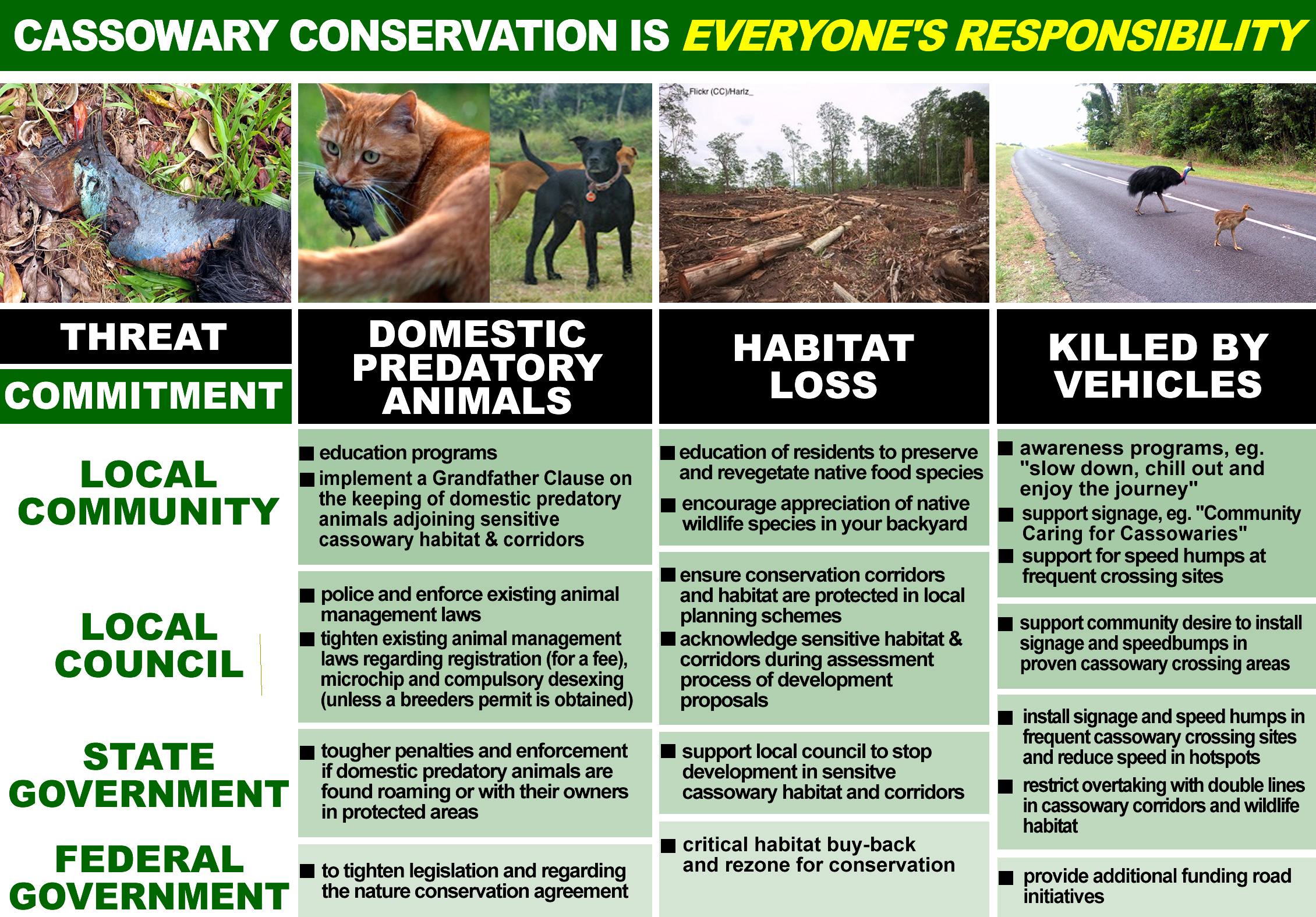
Other Pets
Aquarium pets and plants can become a huge problem in our water ways
Never release unwanted fish, snails or crayfish into creeks, ponds, or rivers they can quickly become feral species out competing our unique natives. Choking waterways causes immense damage to our native aquatic plants and causes imbalances with native fish becoming extinct in that area.
Caged birds or other pets or livestock should never be released into the environment. Animals released into the environment can become a major pest, wipe out other species, or introduce diseases and parasites. They may also struggle to find food and look after themself in the wild and die.
If you no longer wish to care for an animal please talk to the Council, Vet, or RSPCA who may find a new loving home.
More information:
Don’t feed wildlife
Even though it is tempting, close contact and feeding domestic food can threaten wildlife. Native animals are capable of feeding themselves and need to teach their young to do the same. Domestic fruits, processed food that is very high in sugars, can change the palate of native animal just like us, where we no longer want to eat what is good for us.
Feeding interferes with an animal’s naturally balanced diet and can entice them out of the rainforest and leads to into danger from traffic strike, or dog/cat attack.
Feeding builds dependency on people (catastrophic when your away on holidays) and creates an imbalance by artificially increasing some species that are favoured.
Never leave food scraps lying around it can encourage rats, mice, insects or unwelcome visitors. We recommend buying a worm farm or compost bin.
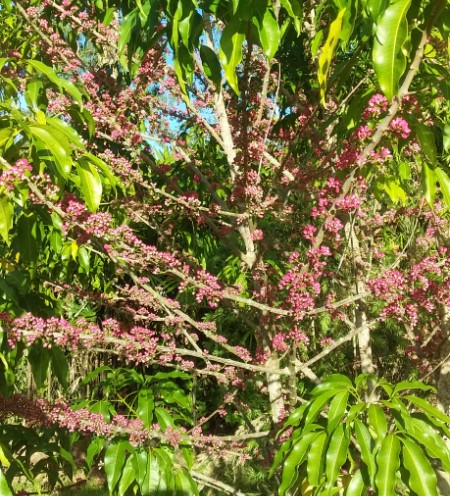 Your Garden
Your Garden
A native garden will bring in more wildlife whist being easier to care. Native gardens require less or no watering or fertilizing or much maintenance. This gives you more time to get out and enjoy your weekends or relax with family or friends. We don’t encourage European gardens as they can escape becoming weeds and some can poison wildlife.
Herbicides and Pesticides
Unfortunately poisons are having a devastating impact on our wildlife and endangered frogs’ species, butterflies’ birds and of insects that are an essential part of the web of life. Please think twice before you spray and look for more friendly alternatives.
Living with Wildlife
Restrict pets to a different area away from wildlife, and always keep locked up at night
Watching wildlife in the backyard is one of life’s simple and rewarding pleasures we enjoy living adjoining the Wet Tropics with it’s interesting and diverse wildlife. The Wet Tropics is considered one of the world’s biodiversity hot spots, teeming with birds, animals, reptiles, and frogs – many species are found nowhere else on Earth. Many of these are permanent residents whilst others are migratory visitors we look forward to seasonally. We encourage residents to grow native gardens to support wildlife in their backyards. Build a pond or water feature, and carefully consider if a domestic pet is right for you in this new location with all its wonderful wildlife, as you will reduce your wildlife encounters.
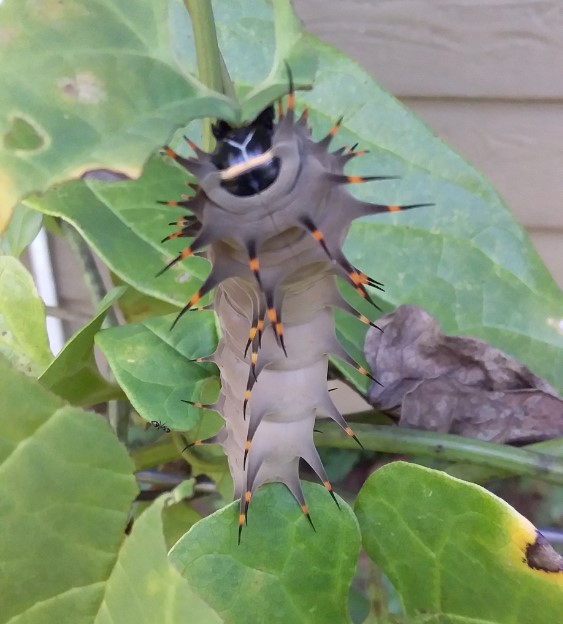 Attracting Wildlife- birds, butterflies, and frogs the right way
Attracting Wildlife- birds, butterflies, and frogs the right way
- Only if you don’t live in an area without aerial spraying you may like to plant a variety of local native flowering shrubs, vines, and trees to attract birds and butterflies.
- Leaf litter and branches create cool, moist areas will create havens for frogs, lizards and skinks.
- Ponds and bird baths are a wonderful addition for wildlife on a hot summer’s day.
- Be sure to have shrubs and branches for birds to perch on after a drink or swim to keep them safe from predators.
- Avoid using herbicides and pesticides.
- If you own a dog or cat, it is not recommended to encourage wildlife into your yard.
Mammal, Bird & Bat boxes
Never chop down old or dead trees with hollows. If there are no natural hollows you can attract mammals, birds, and micro-bats by constructing nesting boxes to recreate old tree hollows that have been destroyed by cyclones, logging, and land clearing. These animals rely on hollows for shelter and to raise their young.
You can find patterns online to build boxes as a fun family project or buy one readymade.
Contact your local Men’s Shed for nesting boxes.
Enjoyable wildlife activities for the whole family.
- Go for a walk on one of our many rainforest walks. Maps available QPWS or online.
- Observe and listen to wildlife, recording your daily visitors in a diary. A bird or species field guide at hand is a wonderful way to learn about the species in your neighbourhood, and you can add important data to different research groups as a citizen scientist.
- Birdlife Australia has a useful app for identification of bird species.
- Collect excess native fruit and seeds to drop off at local nurseries, leave enough for wildlife.
- Spread out some fine wet sand, and in the morning see if you can identify footprints.
- Spotlight for eye shine to see which animals are most active at night.
- Join a citizen science group to identify frog calls and help with tracking movement and populations sizes of these increasing endangered species.
Things that Bite or Sting
This information is you alert you to possible dangers and how to avoid them. This section should be used as a guide only. If in doubt seek medical advice or call 000.
Mosquitoes– especially common during the wet season. Apart from irritation they can cause, some carry diseases such as Dengue Fever, Ross River Fever and Bahmah Forest virus.
- Dengue fever is a very unpleasant illness that can last for many weeks and causes joint pain and fevers and can sometimes be fatal.
- Ross River Fever is like an extended Dengue Fever lasting a year or more, a debilitating illness.
- Barmah Forest virus has effects the same as Ross River virus but can also be transferred between humans and animals, the effects can reoccur for years after the initial attack.
Prevention is the best advice
- Screen your home, you could use nets over beds at night.
- Never leave water around home for mozzies to breed in, (they don’t travel far)
- At sundown light mosquito coils to repel.
- Some plants also discourage mozzies and other insects talk to local nursey.
- Keep yards free from rubbish and palm fronds this also reduces harbouring rodents, snakes, and other undesirables. Please note many native or endangered mammals and marsupials can be confused with rats or mice. We recommend live traps and release until you learn the difference, then a ‘break back’ trap is best. We do not recommend rat sack or products like this as they have proven secondary kills on native wildlife and predatory birds. Cassowaries love eating rodents as a good protein source, they have been known to eat poisoned dead rodents and have died.
Leptospirosis– Mammals including dogs and cats can spread diseases like Leptospirosis, especially through their urine and faeces. Rats in particular spread the disease and they can easily contaminate food preparation areas. The best defence is good personal and household hygiene.
- Wash your hands, keep food preparation areas clean, store food away, cover open wounds and keep dry. This potentially fatal disease presents as cold like systems with high fever and joint pain. Seek medical attention immediately.
March Flies or Horse Flies– these are large biting flies common over the hottest months and come out after rain. They are said to be attracted to dark colours. Whilst their bite stings it is only brief, at times they can arrive in large number becoming wearying, allow to land before swatting. Little can be done to repel these flies other than shut them out. They may be dangerous for people allergic to Sulphur drugs and medical attention may be needed.
Spiders– There are many different and amazing spiders to be found in the tropics. Most are harmless and all are great insect eaters, we advise you stay away and not kill. The beautiful Golden Orb spider builds a web of spun gold and is not harmful.
- Red back spiders on the other hand are very serious requiring urgent medical attention. The spider has thin dark legs and a pea like round abdomen, with a bright red stripe running down its back. Interestingly one of the symptoms is a sense of dread.
Snakes– There are a wide variety of snakes that live in the Wet Tropics, most are shy and non-venous. The largest are the amazing pythons, many tree snakes are harmless and do a wonderful job of catching rodents.
- The Taipan to being with can turn aggressive and is the most dangerous.
- Red belly black snakes are very shy and generally move away from you at great speed but is venous so stay aware.
- The Death adder is an ambush hunter laying under the leaf letter highly poisonous but has a small, restricted range and is uncommon.
If you have a snake in your home call your local snake catcher, never try to relocate yourself. Keep their number in your phone.
All snakes are protected species.
Cane toads– These introduced invaders poison most things that try to eat them this includes your pets. At all stages of their life they lay huge numbers of poisonous eggs, the toad poles and toads are all poisonous they destroy aquatic environments and their surrounds. You can help to reduce cane toad numbers with regular toad hunts. Use plastic bag to capture, ensuring bag is locked securely and humanely euthanize by placing in your freezer and put in bin. Cane toad eggs look like a string of black dots in clear spaghetti. No native frogs lay eggs this way. Lift eggs out of water and dry in sun. Remember these eggs are toxic, so always wash hands after handling them and keep pets away from them.
Stinging trees– A common edge plant in disturbed forest and clearings. The giant heart shaped leaves with purple raspberry like fruit are difficult to see. The leaves and stems are covered with fine stinging hairs which can inflict pain for many months and often the lymph nodes will swell almost immediately with intense pain that can last a few days. One treatment is to remove the stinging hairs by applying artificial skin or similar film then peeling off. Pain killers are not usually effective. While it grows into a small tree most stings are caused by young growing plants. Even a dead leaf can cause a sting. Not to be confused with the Bleeding Heart which has shiny leaves and new growth bright red or orange, also the introduced scrambling weed the Raspberry vine. It is wise to learn to identify and avoid this plant and talk to someone in local nurseries.
Leeches are common in the rainforest, a good repellent if going bush walking in rainy weather is 50/50 coconut oil and Dettol. Once attached don’t put off as you will bleed more and itch more and in could become infected if the mouth part remains. If you place a little salt on their body this will make them release.
Paper wasps while painful is rarely dangerous often found in trees or the garden, if disturbed they can become aggressive protecting their football shaped nests.
Keep “Stingos” in your First Aid Kit readily available from chemists and is effective at easing pain or use ice. Some people suffer anaphylactic allergic reactions and require antihistamines or medical attention immediately.
Hairy Caterpillars– can cause a severe sting if touched, so are best avoided. They live in web like nests in trees and are hard to see, some for long lines to travel and are fascinating whilst others are solitary. We look forward to seeing the butterflies of these living marvels.
Ticks – There are many ticks some the size of a grain of sand to others the size of a pea. The pea size Shell Back are more toxic, cause various reactions some people will suffer itching and swelling right up to acute anaphylaxis shock requiring immediate medical attention. Some ticks are known to carry diseases. They are best killed without disturbing with Methylated Spirits or Rid once dead remove with tweezers as close to head part within your skin as possible. Please check pets regularly and take immediately to the Vet if affected.
Scrub Itch– This tiny mite is usually invisible to the naked eye; they live in decaying wood in the rainforest. It is not a good idea to sit or leave towels or clothes on the forest floor. They with find folds in skin or under belts or bra straps to dig in and cause red lumps, fierce itching and swelling. Try not to itch as you can become infected, kill mite with Methylated Spirits and apply Tea Tree Oil.
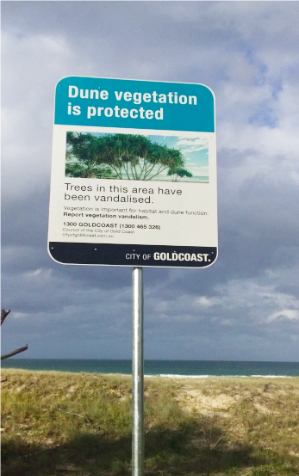 Coastlines
Coastlines
Birdlife Australia has a wonderful campaign to protect shore birds.
It is well documented the threat posed by both feral and domestic cats to native wildlife, what is not so well known is the threat our pet dog poses to critically endangered sea and shore birds.
Dogs having fun chasing migratory shore birds is disastrous for shore birds even if they never catch them. We have very few places left on earth that are free of the impacts of humans. We urgently need to put some beaches aside just for nature to do its thing. Turtles return to the same beaches they were born on to lay their eggs, when these are disturbed by humans, they must find a safe haven.
Guardians of the Wet Tropics is working with Birdlife Australia to educate the public on managing your dog on the beach and to create dog exclusion areas in critically endangered seabird, shorebird breeding areas and sea turtles nesting or hatching sites to protect nests from been driven over or dogs digging up their nests.
Amazing Migrations– each year shorebirds migrate to and from Australia between their breeding and feeding habitats. Some weighing as little as 30 grams migrate 25,000km annually. Some species may fly more than 11,000km non-stop. By disturbing sea or shorebirds, we reduce their survival prospects and is also an offence. Every time shore birds are forced to take flight; they burn vital energy. Birds can be found with plastic, hooks & fishing line blocking their digestive system.
Little Terns– this endangered little sea bird needs your help. Flying from Siberia to Australian East Coast beaches to lay their eggs and spend 6 weeks raising their young.
- Make sure your dogs don’t enter the area to dig or defecate.
- Please don’t allow your dog to chase birds
- Avoid walking above high tide mark where nests or chicks are residing.
- Don’t damage foreshore vegetation or collect driftwood as the small (thumbnail) tern eggs are very hard to see and are easily crushed.
- Prevent pollution- almost all rubbish & pollutants discard on land end up in the water.
- Reduce anchoring or boating near nesting or roosting birds.
- Please don’t walk or drive on dunes or in foreshore vegetation as this is their nesting area.
Marine Life and our Oceans
Our coastal waters– are full of an amazing diversity of marine life. Sightings of turtles, dolphins, dugongs, and whales are always breathtaking. Occasionally these marine creatures can become stranded or wash up on the coastline. Fishing lines netting, six pack holders and plastic kills marine life and birds. If you see these or any major fish deaths, oils spills or large areas of pollution washed up please contact Queensland Department of Agriculture and Fisheries 24 Hour Hotline 1800 017 116.
Marine Creatures
Crocodiles– Live in salt and freshwater environments, they can occur on beaches, off-shore islands, and even freshwater swimming holes. Their long-term survival is threatened by habitat loss and development in estuaries and along the coastline.
 Be Croc Wise:
Be Croc Wise:
- Obey all crocodile warning signs. They are there for your safety and protection
- Don’t swim where crocs live
- Don’t stand on overhanging logs or deep pools or riverbanks especially when fishing, stand well back.
- Never leave fish scraps at water’s edge or camp site
- Don’t dangle arms or legs out of boat.
- Don’t feed crocodiles it is illegal and extremely dangerous
- Camp at least 50 meters back from waters-edge
- Be more aware at night and in summer months September to April.
Contact the Department of Environment and Science Hotline 1300 130 720
Marine Stingers – Stay out of the water during summer months (October- April) keep an eye out for when the stinger nets go out and use these when swimming.
Box Jelly fish– A large but almost transparent jellyfish with a box- shaped bell up to 38cm in diameter. Up to 17 ribbon-like tentacles arise from each of the four corners, this may contract to 10cm and extend up to 3m.
Symptoms. Immediate severe burning pain and whip like marks. Often with tentacles remaining on the stung area. Severe stings may cause the casualty to stop breathing and can suffer cardiac arrest.
First Aid-
1) Remove casualty from water
2) DRSABCD
3) Dial 000
4) Commence CPR
5) Pour vinegar for at least 30 seconds
Irukandji– Small transparent box jelly fish, 1-2cm in diameter, usually not seen. Some may be up to 10cm long.
Symptoms and signs- initial minor skin sting followed 5-40 minutes later by severe generalised muscular pain, headache, vomiting and sweating. The sting from some species can cause very high blood pressure or have effects on the heart which may be life threatening.
First Aid- The same as Box Jelly fish.
Handy Contacts
Marine Safety Search and Rescue – 1800 641 792
Marine Hotline – Department of Fisheries Queensland Hotline – 13 25 23
Turtle Hotline – Marine Animal Stranding call – 1300 130 372
GBRMPA Hotline – Pollution – 1800 341 211
Report fish deaths – 1300 130 372
Marine and Island National Park Illegal Activity 24 Hours – 1800 380 048
Wildlife Carers – Far North Queensland Wildlife Rescue 24 Hours – 07 4053 4467
Many Local Primary Schools are part of the Reef Guardian Schools Project.
We are working towards being a Plastic Free town.
We care for and protect our environment by Refuse, Reduce, Reuse, Recycle.
